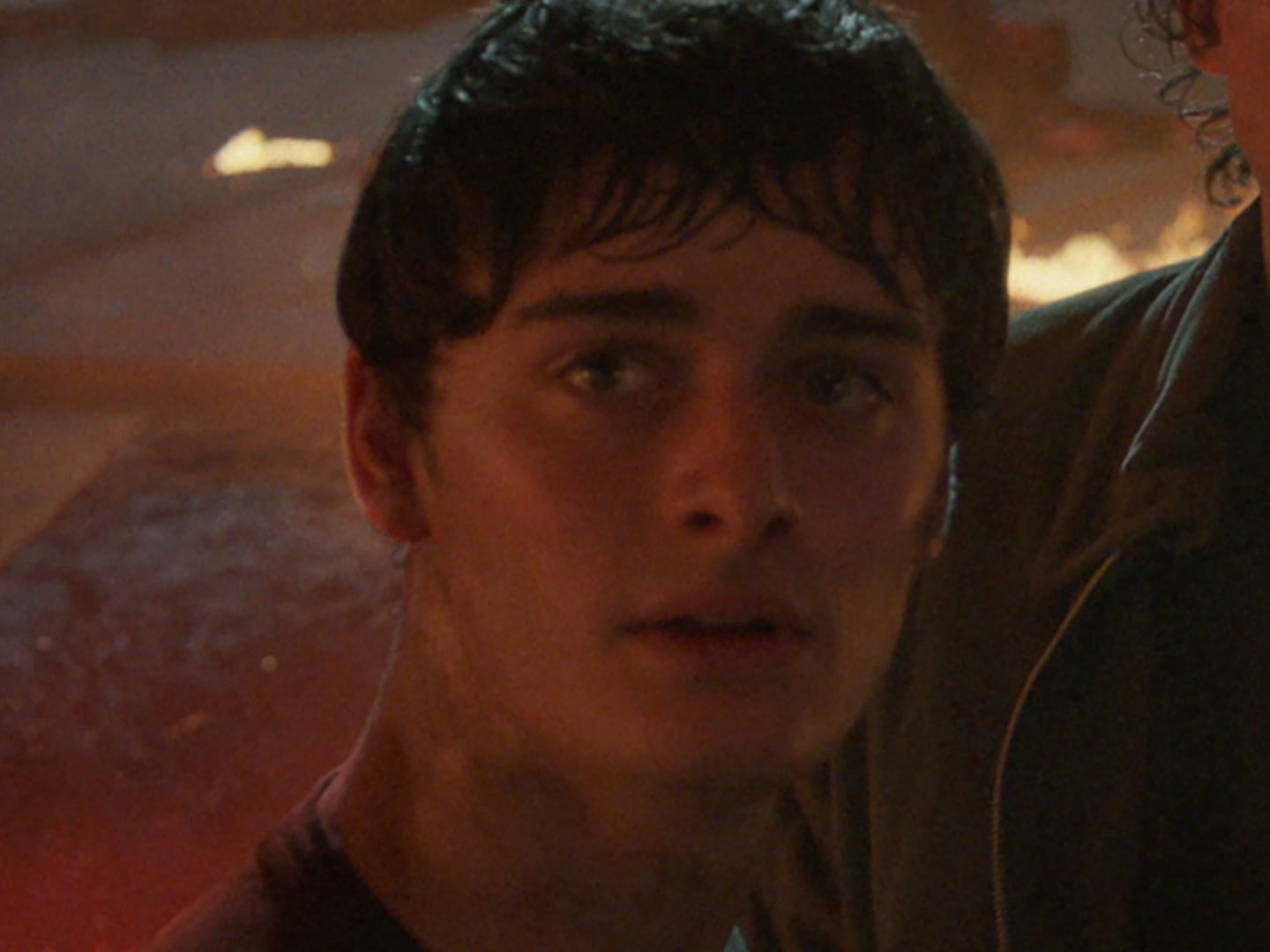Colin Farrell’s stardom may have originally been predicated on his good looks and ladies’ man magnetism, but the 45-year-old Irish actor’s most affecting performances—in Terrence Malick’s The New World and Yorgos Lanthimos’ The Lobster—have plumbed a deep well of anguish and fear, loneliness and longing. It’s those qualities that writer/director Kogonada taps into with After Yang (March 4, in theaters and on Showtime), a melancholic science-fiction tale (based on Alexander Weinstein’s short story “Saying Goodbye to Yang”) about a family forced to come to terms with the irreparable malfunction of its robotic “technosapian” member, Yang (Justin H. Min). An unusual study of loss and alienation that’s augmented by the same meticulousness Kogonada brought to his prior Columbus, it’s a meditative inquiry into what makes us who we are, and binds us to each other—issues which movingly come to the fore courtesy of its headliner’s stellar turn.
Farrell is Jake, a tea-shop owner in an unspecified future who lives with his wife Kyra (Jodie Turner-Smith), their adopted daughter Mika (Malea Emma Tjandrawidjaja), and Mika’s inhuman sibling Yang, a “cultural techno” whom Jake and Kyra purchased—“certified refurbished”—in order to provide their daughter with a companion who could teach her about, and thereby strengthen her ties to, her Chinese heritage. Yang is treated like an integral part of this clan, especially by Mika, who adores him. Kyra, however, worries that she and Jake have become overly reliant on their assistant, not only in handling the day-to-day duties of the household, but in raising their child—a concern that Jake doesn’t dispute so much as casually shrug off in a manner that suggests he has no solution to this quandary, and would prefer to take the easy way out and just proceed along their current route.
A mesmerizing opening-credit dance routine performed by Jake, Kyra, Mika and Yang (as well as other families) highlights the in-sync nature of this domestic unit. Their harmony, though, is disrupted when Yang suddenly shuts down. With Mika distraught over this calamity, Jake seeks out a repair, only to learn that the original business that sold him Yang is gone (instead, he stumbles upon a pet shop, where he buys Mika a fish). Consequently, he takes him to Russ (Ritchie Coster), a mechanic who breaks the law by breaking into Yang’s core. The diagnosis Jake receives, alas, is that Yang is probably busted beyond salvation. Worse, the robot is loaded with what appears to be spyware. In response to this discovery, Jake is sent to the Museum of Technology, where technosapian scholar Cleo (Sarita Choudhury) explains that what Jake has found isn’t a surveillance mechanism, but Yang’s database of recorded memories.
Jake thus finds himself on an odyssey to fix the potentially unfixable, and also to understand Yang, whose recollections he accesses via glasses that immerse him in a virtual-reality realm that resembles a galaxy of data-point stars. During his journeys into Yang’s archived mind, Jake re-experiences prior interactions between the two, such as a conversation in which Jake expounds on his fondness for tea, whose tastes seem to contain potent worlds. He additionally determines that Yang had a secret female friend whom he later ascertains is named Ada (Haley Lu Richardson). Since no one has ever heard of a robot developing emotional (much less amorous) relationships with individuals to which it was not assigned, Yang and Ada’s clandestine affair proves a surprising puzzle that the forlorn Jake feels compelled to better comprehend.
No matter this investigative narrative spine, After Yang is not a suspenseful genre effort; its focus is on Jake’s gradual process of self-discovery, instigated by Yang’s demise. With quiet eyes and an equally still demeanor, a lightly bearded Farrell evokes Jake’s sorrow and confusion through gentle gestures and body language. The exact opposite of his Penguin in Matt Reeves’ The Batman, Farrell’s Jake is a man grappling with an existential malaise borne from internal and external disconnection. Yang’s “death,” and the rupture that it creates in Jake’s heart and home, exacerbates his detachment from Kyra and Mika, from an irretrievable past, and from nature and the universe. Such notions about mankind’s links to history—and whether they, or something more tangible and ever-present, define our identities—are also central to Mika’s learning-about-China rapport with Yang and course through the film like a calm, winding river.
Jake’s sleuthing results in revelations about Yang’s prior life and closeness to Ada, which further complicate his ideas about what it means to be human. Farrell conveys his protagonist’s misery and yearning with a subtlety that’s echoed by Kogonada’s direction, marked—as was Columbus—by manicured compositions in which modern and classical architectural structures echo characters’ interior states. Setting his action to plaintive cello and piano, not to mention Mika’s a cappella rendition of Mitski’s cover of “Glide” (which was Yang’s favorite song), Kogonada expresses his subjects’ trapped-and-alone circumstances by framing them in distant doorways and constricting window panes, stranding them in close-ups that separate them from their partners (as during a fraught conversation between Jake and Kyra), and spy on them from behind suffocating glass—the last of these devices mirrored by Yang’s collection of mounted butterflies.
Kogonada stages Jake and company’s search for union with a light touch that never wavers, be it during Jake’s perusal of Yang’s memories (assembled as a montage of quick-hit home movie highlights), or in his late-night chats with Mika, whom Tjandrawidjaja embodies with a charming naturalness that helps sell both the character’s grief and, as a result, Yang’s authenticity as a caregiver worth caring about. Without ever raising its voice or making a grand spectacle, After Yang probes the way we cope with the departure of those dearest to us, wonders what that tells us about our attitude toward ourselves, our fellow man, and our place in the grand scheme of things, and accepts the contradictions and complexities that drive us apart and bring us together. In a manner not unlike Yang himself, Kogonada’s film appears, on its surface, to be merely a serene, ruminative indie drama, yet lurking within it are multitudinous mysteries waiting to be unlocked.






